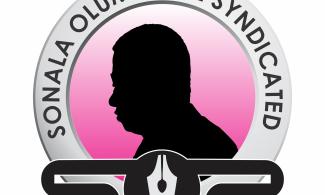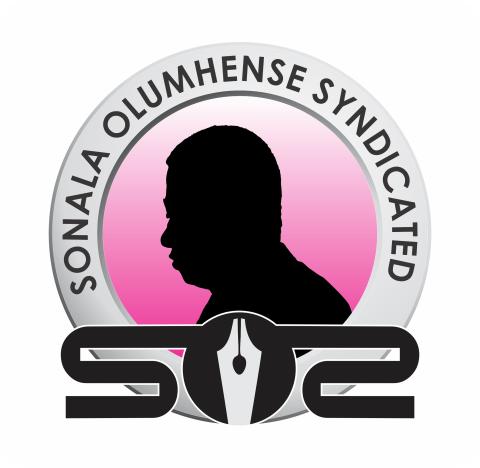
The way I hear it, there are curious signs of improvement in Nigeria.

Among them: electricity and petroleum products seem to be more available.
The Economic and Financial Crimes Commission (EFCC) seems to have a bolder and firmer understanding of economic and financial crime. The police appear to be reinventing policing, slowly turning its focus to crime and criminals, and somewhat away from law-abiding citizens.
Alongside—or on top—of all of this, is a new industry: the manufacturing of excuses and explanations which favour of Nigeria’s former leader, Goodluck Jonathan.
Among its most notable: The National Peace Committee, headed by General Abdussalam Abubakar; Dr. Mike Okonkwo, the leader of the Redeemed Evangelical Mission (TREM); and Nobel Laureate Wole Soyinka.
Professor Soyinka gave his remarks when Jonathan was still in office, although they have just been published by the EFCC.
“There are forces around Jonathan, you put your fingers around it, which he himself does not understand and that is why I stressed that, you've got to choose your circle of advisers very carefully, when you are in charge,” he said. “He's been caged; things are going on…he did not know about."
He added: "When it comes to the issue of corruption, Jonathan surrounds himself with certain unsavoury characters and that is something you don't have to do if you are in charge.”
Bishop Okonkwo, for his part, told Vanguard newspaper that GEJ appeared to have been under a spell, from which Nigeria’s “Men of God” failed to deliver him. The Christian chieftains, he said, had “the responsibility of taking him out of the spell, [praying] with him even for three days and whatever was holding him would have been removed…”
Then there is the “Peace Committee,” which visited President Muhammadu Buhari last week supposedly “to discuss how to “wind up” and to check if there was a new national assignment they could undertake.”
Committee member Bishop Matthew Hassan Kukah, the respected Catholic Archbishop of Sokoto Diocese, explained that the committee was not against combating corruption, but wanted to ensure “due process”. They wanted to make it clear this was a democratic 2015—not a 1983 military contraption—and that all are innocent until proven guilty.
It was curious that the committee went to the president, who has consistently underlined the rule of law, to make the case about the rule of law.
Contributing to the same developments last week was the PDP’s Senate Caucus, headed by former Akwa Ibom State governor and now Senate Minority Leader Goodswill Akpabio, which denounced Buhari’s push against corruption.
“The current war lacks transparency, fairness to all and appears to be aimed at political adversaries,” the group said in a statement. They alleged that in the PDP States of Abia, Rivers and Akwa Ibom, the State Security Service was hounding government opponents and intimidating electoral officials using “trumped-up” charges.
“The PDP Senate caucus is worried, alarmed and shocked by the recent development in our polity where the DSS is now involved in electoral matters,” they said.
All of this is coming on the eve of an anti-corruption comeuppance that Buhari has promised since he began to contest for the presidency in 2003. That was before GEJ was ever heard of as a politician; before Akpabio became governor; and before one Marilyn Ogar—not a Buhari government—dragged the DSS into electoral matters.
The problem is that all of this constitutes dancing on the periphery of the dance floor, which is that Mr. Jonathan will find it hard to avoid a corruption mud-bath in which he could drown.
Such an embarrassing prospect could have been avoided, perhaps in 2010 when Jonathan routinely said he would combat corruption, only to embrace it. It could have been avoided in 2011 when he erected his vast mountain of electoral promises that he would scandalously ignore. It could have been avoided in 2012, but that was when he scornfully rejected the notion of declaring his assets, and then began to provide philosophical cover for corruption.
Nigeria is the funniest village on earth when it comes to corruption. Every single citizen wants the menace to be confronted and defeated, unless where it involves us or our relatives, political or otherwise. That is when we call the idea unprintable names.
This is the fork in the road at which we now arrive. At one end is the meaningless Peace Committee, hiding under the umbrella of “due process” to trumpet GEJ’s “spectacular achievements” as a currency.
Where did GEJ hide his “spectacular” achievements? Did he defeat Boko Haram? Did he defeat unemployment? Did he defeat corruption? Did he implement his electoral promises? Did he implement a presidential report? Did he Transform Nigeria? Did he Bring Back Our Girls? Did he inspire a child?
Hopefully, the Peace Committee will provide answers, or else leave us with the conclusion it simply wishes a “soft landing” for GEJ ahead of the imminent probe of his kleptocracy. Otherwise, why preach due process to a government that has declared it to be non-negotiable, especially when you have never said anything productive about the scorched-earth corruption in the land?
Soyinka has unfortunately also provided the sour suggestion that GEJ may somehow be less than culpable for the mess he made of his leadership because he was “caged,” and had surrounded himself with “unsavoury” characters?
Who caged GEJ? The characters he surrounded himself with were his, and at no point did he reject anyone as undesirable. In fact, he went out of his way to bring back to respectability such characters as former Bayelsa State Governor Dipreye Alamieyeseigha, granting state pardon to a man recognized internationally as a byword for corruption in our country.
Similarly, if you take away Bishop Okonkwo’s coded language, Jonathan was a good man with great intentions. He wasn’t caged; he was trapped behind a spell.
Finally, Senator Akpabio, himself the poster child for lack of accountability, now leads the PDP’s charge against what the party describes as lack of transparency and fairness.
Akpabio ran AI like a personal estate from an executive jet, an expensive toy AI never needed. And it is on record that in 2014, he confessed the malfeasance that was the PDP. “We have messed up…” he told Obasanjo during a well-publicized encounter. “For me, I don’t want to go to jail and my children are too young.”
Akpabio was begging that his children not have to face such a imposed on them by the menace of the PDP, but he showed absolutely no concern for the children of hundreds of millions who suffer deprivation and pain every day for the same reason.
In the end, the question is whether, in the Jonathan years, what passed for governance in Nigeria was one, and whom it benefitted.
The time has come for those who ran Nigeria to answer questions about what they actually did, and how. It is a question of justice, not opinion.
Where I come from, that is called “answering your father’s name.” It is actually a simple question, unless you have no idea whom your father is.
In that case, you might call the question malicious, or a witch-hunt.
• [email protected]
• Twitter: @SonalaOlumhense